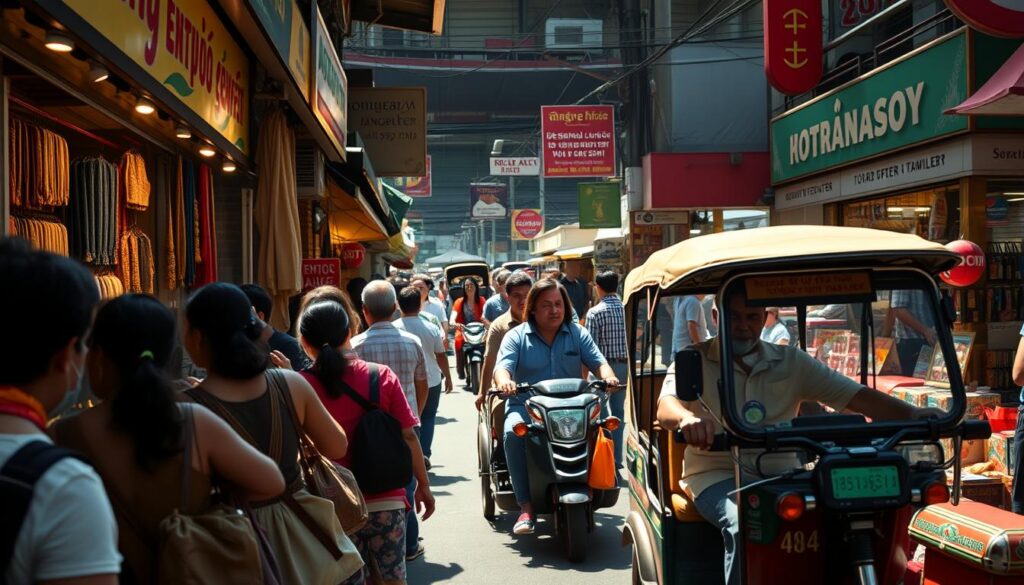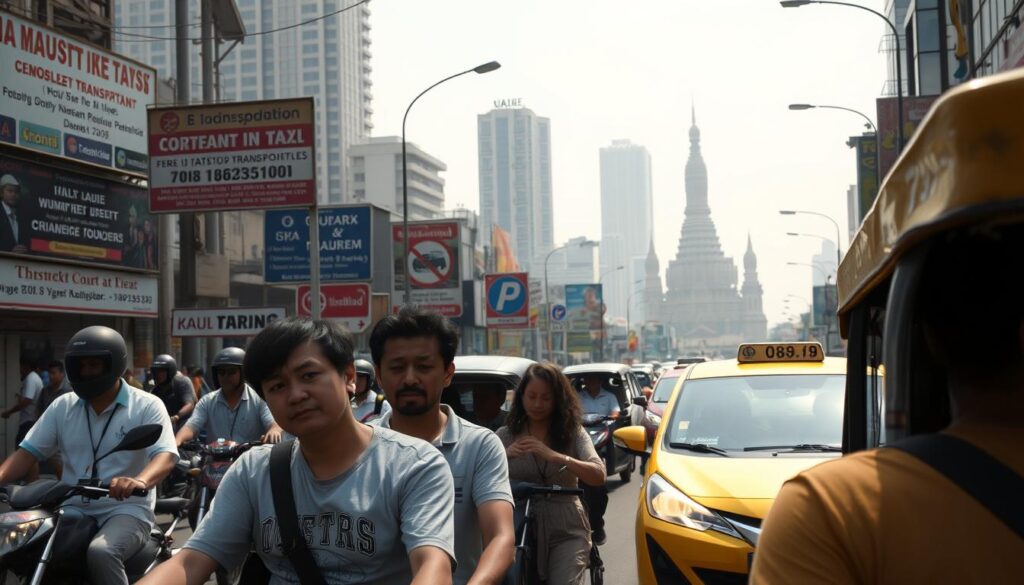Thailand Scams: Avoid Tourist Traps & Common Tricks
Did you know millions of tourists fall victim to scams in Thailand every year? It’s a shocking fact that can ruin a dream holiday. As you plan your trip, knowing the common tricks and traps is key.

Learning about scammers’ tactics can make your trip safer and more enjoyable. Being informed is your strongest defence against Thailand travel scams. From too-expensive tuk-tuks to fake tour operators, knowing these scams can save you trouble.
Stay alert and know what to look out for. With a few simple precautions and knowledge of common tourist traps in Thailand, your trip can be memorable and worry-free.
Understanding Common Scams Targeting Tourists
When you’re in Thailand, you might face scams. It’s key to know what to watch out for. Knowing the tricks scammers use and where they happen can keep you safe.
Common Techniques Used by Scammers
Scammers in Thailand use clever ways to trick tourists. They might offer too-good-to-be-true deals, say places are closed, or try to rush you into decisions. To dodge these scams, stay alert and don’t rush.
- Be cautious of deals that seem too good.
- Check facts through official sources.
- Don’t make quick choices when pressured.
Places Where Scams Are Most Prevalent
Scams often happen in tourist spots and transport hubs. Being careful in these places can help you avoid scams. Watch out for:
- Popular tourist attractions.
- Busy markets and shopping areas.
- Major transportation hubs like airports and bus stations.

Knowing scam tactics and where they happen can lower your risk. Stay informed and be careful to avoid scams in Thailand.
Tuk-Tuk Scams: What to Look Out For
Tuk-tuks are a fun way to see Thailand, but watch out for scams. They’re popular with tourists for their excitement and novelty. But, this popularity also makes them a target for scammers.
Why Tuk-Tuks Are Popular with Tourists
Tuk-tuks are a thrilling way to explore Thailand’s busy streets. Their open design lets you see the local culture up close. They’re also seen as a fun and memorable experience for short trips.
Key reasons for their popularity include:
- The excitement and novelty of riding in a tuk-tuk
- The ability to see local sights up close
- The flexibility to change plans or stop at will
Typical Tuk-Tuk Scam Scenarios
While tuk-tuks are great for getting around, there are scams to watch out for. Common scams include being taken to overpriced gem shops, tailor shops, or restaurants. The tuk-tuk driver gets a commission for bringing in customers.
To avoid these scams, consider the following tips:
- Agree on the fare before you start your journey
- Be cautious of tuk-tuk drivers who claim certain attractions are closed or that you need a special tuk-tuk to get there
- Avoid tuk-tuks that approach you; instead, find a reputable tuk-tuk stand

By knowing about these scams and taking precautions, you can enjoy tuk-tuks without getting scammed.
Gem Scams: The Glittering Deceit
When you’re a tourist in Thailand, knowing about gem scams is key. These scams offer unusually good deals on gems. They often sell fake or low-quality gems at high prices.
Tourists are targeted with “wholesale” prices or “special deals” that seem too good to be true. This makes them think they’re getting a great bargain.
How Gem Scams Operate
Gem scams work by scammers promising to sell gems at a low price. They say they’re selling at a loss or it’s a one-time offer. They use high-pressure sales to make tourists decide quickly.
Common tactics include: showing fake certificates of authenticity, using persuasive sales pitches, and creating a sense of urgency. Scammers may also claim that the gems are rare or of high quality, when in fact they are not.

Tips to Avoid Falling for Gem Scams
To avoid gem scams, be cautious and do your research. Here are some tips:
- Research reputable gem sellers and check for reviews or ratings.
- Be wary of too-good-to-be-true deals or prices that are significantly lower than market value.
- Never make a purchase without verifying the authenticity of the gem and checking for a genuine certificate.
- Avoid making impulse purchases or decisions under pressure.
By being informed and cautious, you can enjoy Thailand without falling for gem scams. Always check the authenticity of any gem purchase. Be aware of the common tactics used by scammers.
Fake Tour Operators: Know the Signs
Exploring Thailand’s beauty can be wonderful. But, knowing about fake tour operators is key to avoiding scams. These operators lure tourists with offers that seem too good to be true.
Red Flags of Fake Tourist Services
Stay alert and watch out for warning signs to dodge fake tour operators. Some red flags include:
- Unusually Low Prices: If prices are much lower than others, it’s a warning sign.
- Aggressive Sales Tactics: Be cautious of operators pushing you hard to book.
- Lack of Clear Information: Good tour operators share detailed info. Be wary if they don’t.

Recommended Reputable Tour Operators
For a safe and fun trip, choose reputable tour operators. Here are some top picks:
- Thailand Tour Center: Known for their professional service and wide range of tours.
- Worldwide Tours: Offers a variety of tours with a focus on customer satisfaction.
- Thai Odyssey: Praised for their knowledgeable guides and well-organized tours.
Before booking, check the operator’s reputation online, read reviews, and verify their credentials. This ensures you’re in safe hands.
Currency Exchange Scams: Handling Money Smartly
Traveling to Thailand means being careful with money. Scams can hurt your budget. It’s key to know how to spot and avoid them.
Scammers target tourists with bad exchange rates or fake money. Stay alert and informed to handle these situations well.
Spotting a Currency Exchange Scam
To dodge currency scams, learn the signs. Here are some tips:
- Always check the exchange rate before you trade.
- Be cautious of services with rates far from the market rate.
- Look for any damage or fake notes in the currency.
- Steer clear of exchanging money at airports or tourist spots, as rates are often worse.
Choose trusted exchange services to lower scam risks. Opt for well-known bureaus or banks with fair rates.

Secure Ways to Exchange Money in Thailand
Exchanging money in Thailand can be safe with a few tips. Here are some good methods:
- Use ATMs for local currency, as they give the best rates.
- Exchange a bit of money at the airport for immediate needs, then find a reliable service in the city.
- Avoid hotels for exchanging money, as rates are often bad.
- Think about using a credit card without foreign transaction fees.
Being informed and careful can help avoid currency scams in Thailand. Always choose reputable services and check exchange rates for a safe transaction.
Restaurant Scams: Beware of Hidden Fees
When you eat out in Thailand, watch out for scams. These can make a nice meal expensive. Scams often hide in unclear menus, extra fees, or high prices.
Understanding the Menu and Prices
To dodge scams, know the menu and prices before you order. Here’s how:
- Always check the menu for prices and ensure you understand what’s included.
- Be wary of menus that don’t list prices or seem unclear.
- Ask your server to explain any charges you’re unsure about.

How to Avoid Sudden Bill Surprise
Avoiding a surprise bill is easy. Just follow these steps:
- Review your bill carefully before paying.
- Check for any additional charges or fees.
- Don’t hesitate to question your server if you notice anything unusual.
Stay alert and take simple steps. This way, you can enjoy dining out in Thailand without unexpected costs.
Transportation Scams: Safety First
Traveling in Thailand can be smooth if you know about common transportation scams. These scams include overcharging for taxi rides and more complex schemes with tuk-tuks or other services.
Common Transportation Scams in Thailand
Tourists often get caught in various transportation scams. These include:
- Overcharging for taxi rides or tuk-tuk services
- Refusal by taxi drivers to use the meter, demanding a fixed price instead
- Tuk-tuk drivers taking you on unscheduled stops or detours to spend money at specific shops or attractions

Tips for Safe and Affordable Travel
To stay safe from transportation scams, follow these tips:
- Use reputable taxi services that have a meter; insist that the driver uses it.
- Agree on the price before you start your journey if the taxi doesn’t have a meter or you’re using a tuk-tuk.
- Research your route in advance to understand the approximate cost and distance.
- Avoid unsolicited offers from taxi or tuk-tuk drivers, specially at airports or tourist hotspots.
By being informed and cautious, you can enjoy safe and affordable travel in Thailand.
Online Scams: Stay Vigilant
Thailand’s digital world is as lively as its culture. But, watch out for online scams targeting tourists. When you search for travel advice, book places to stay, or keep in touch with loved ones online, you face risks.
Common Online Scamming Techniques
Scammers use phishing emails, fake websites, and other tricks to fool tourists. They might pretend to be trusted companies or people. Their goal is to get your personal info or money.
- Phishing emails that seem real, asking for your personal details.
- Fake sites that look like famous travel or banking sites.
- Malware in downloads or links from unknown sources.
How to Protect Your Digital Identity
To keep your digital self safe in Thailand, be careful online. Make sure emails and websites are real.
- Use strong, unique passwords for all accounts. Turn on two-factor authentication if you can.
- Watch out for emails or messages with spelling errors or that rush you.
- Use good antivirus software and keep your devices updated.

By being alert and informed, you can lower your chance of falling for online scams in Thailand. Always check the website’s URL, specially when you’re sharing personal info.
Keep safe online by being careful and taking steps to protect your digital identity.
Final Tips for a Scammer-Free Trip
To have a safe and fun trip to Thailand, knowing about scams is key. Keep your valuables safe and be alert in crowded places. Bangkok tourist scam alerts remind us to stay careful in busy areas and tourist spots.
Precautions and Awareness
When in Thailand, follow safety tips like not carrying too much cash. Use trusted transport services. Be wary of strangers, as they might try to scam you.
Reporting Scams
If you spot a scam, report it to the Tourist Police Bureau in Thailand. For more tips on avoiding scams, check official tourism sites or ask your tour operator. They can help you stay safe on your trip.

